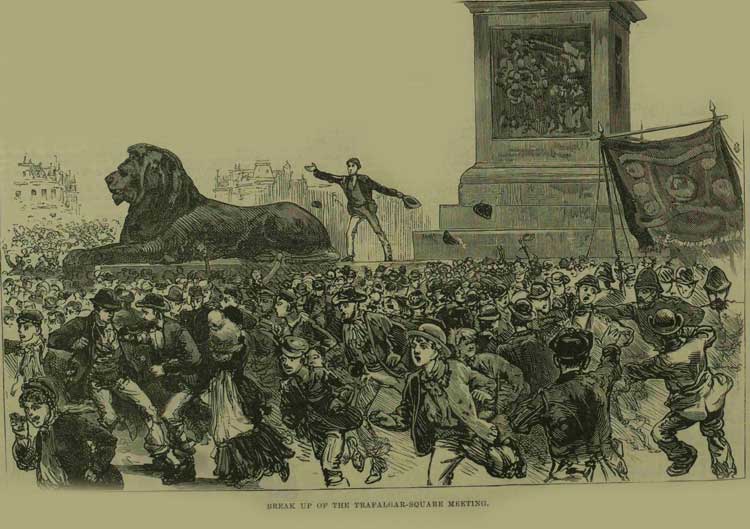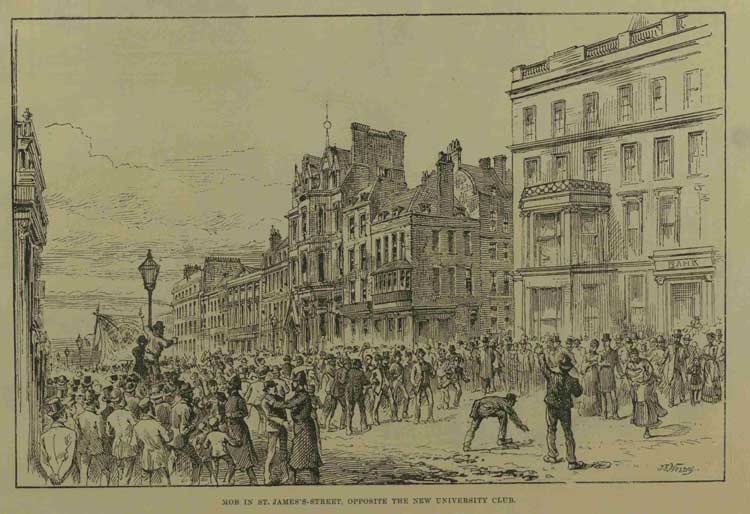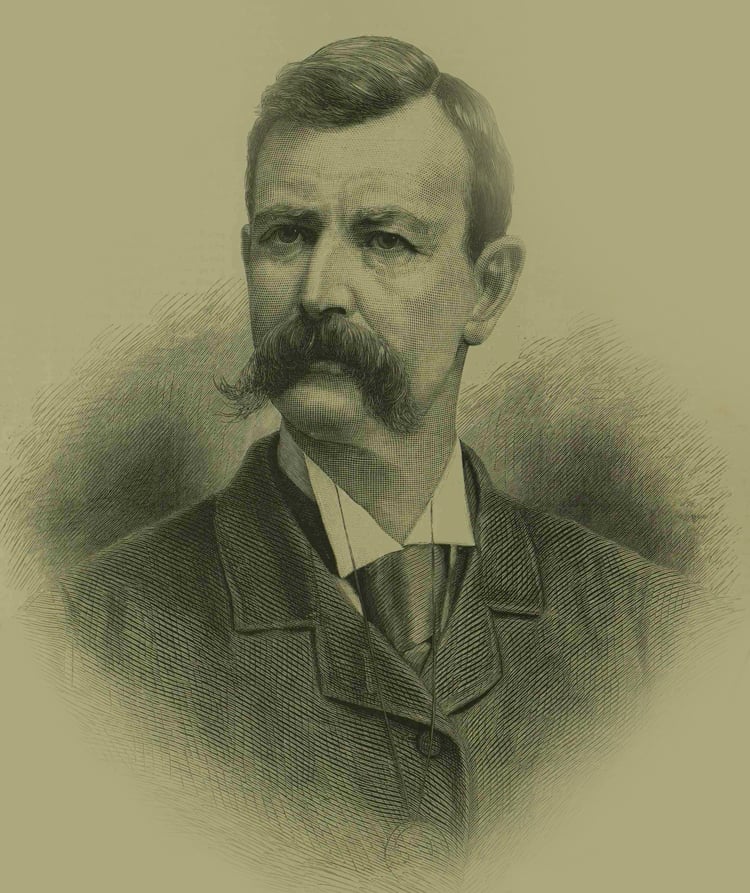As London recovered from the events of Bloody Sunday, the newspapers began reacting to what had happened in the West End in the afternoon and early evening of Sunday 13th November 1887.
On Monday 14th November 1887, the liberal-leaning Pall Mall Gazette, filled many of its pages with articles expressing absolute outrage at what it saw as an attack by the authorities on the liberty of freeborn Englishmen.

WARREN MUST GO
In one column it called for the dismissal of both the Home Secretary, Henry Matthews, and the Metropolitan Police Commissioner, Sir Charles Warren:-
“The net result of yesterday’s coup d’état will be the ejection of her Majesty’s Ministers from office and the establishment in their places of men who will not prepare to deluge London with blood in order to commit an illegal act for sheer caprice.
Sir Charles Warren also will have to go, and Mr. Matthews first of all.
But the Government is doomed.
Not all the Queen’s horses and all the Queen’s men will be able to re-establish the Government in the position from which they fell when they laid lawless hands on the most cherished liberties of freeborn Englishmen.
It is difficult, not to say impossible, at this early hour to gauge the intensity of the indignation and horror with which the news of yesterday’s coup d’état will be received throughout the country.
There is not a Tory candidate who will not seem to our people to be smirched with the blood which streamed yesterday from the heads of many a loyal and peaceable citizen.
Liberty has been outraged: in its most sacred citadel, and the vindication will somewhat surprise those confident gentlemen who are so loudly congratulating the police for suppressing a public meeting in the heart of London.”

THE LEGALITY OF THE POLICE ACTION
The Gazette was firmly of the opinion that Sir Charles Warren had overstepped his authority in ordering the break up of the rally:-
“The first legal question arising out of yesterday’s series of violent assaults by the police upon the peaceable citizens of London arises out of the attack on the processions.
Hitherto no Chief Commissioner has ventured to assert that he had a right to break up a procession.
The Lord Chief justice, in a recently decided case, laid down the law of procession very strongly, and the courts have invariably set aside all municipal bye-laws prohibiting the exercise of this right.
The Chief Commissioner bases his claim to order his men to bludgeon the processionists on 2 and 3 Vic., ch. 47.
The clause runs as follows:-
“The Commissioner of Police may make regulations for the route to be observed by all carts, carriages, horses, and persons, and for preventing obstruction of the streets and thoroughfares within the Metropolitan Police District in all times of public processions, public rejoicings, or illuminations, and also to the directions to the constables for keeping order and for preventing any obstruction of the thoroughfares in the immediate neighbourhood of her Majesty’s palaces and the public offices, the High Court of Parliament, the courts of law and equity, the police-courts, the theatres and other places of public resort, and in any case when the streets or thoroughfares may be thronged or may be liable to be obstructed.”
Apart from the fact that no Chief Commissioner before Sir Charles Warren has ever interpreted the clause in this fashion, the obvious meaning of this is that on such occasions as the Chief Commissioner has power to stop vehicular traffic in order to allow the processions to pass.
It gives him no power whatsoever to suppress the processions themselves.
As for the general powers given to issue orders for the regulation of traffic and the prevention of obstruction, if that can be held to cover the prohibition of processions it could equally cover, an order forbidding all citizens to leave their houses at all on any given day.

WOULD THE POLICE BE PROSECUTED?
The Gazette also called for some of those who had been hurt by the police actions to take legal action against their “assailants” for unprovoked assaults:-
“We hope that some of the unoffending processionists, who were bludgeoned by the police, will prosecute their assailants, in order to have the legal point clearly raised whether or not the order of one man is sufficient to justify any number of others in committing violent and unprovoked assaults on the general public.”
BUSINESSES AFFECTED
One of the justifications that had been cited by Warren for prohibiting rallies in Trafalgar Sqaure was that the meetings being held there were having a detrimental effect on the hotels and traders around the West End.
Again, the Gazette challenged this assertion:-
“Among other reasons alleged for emptying the Square is that otherwise the adjoining hotels would be emptied.
In connection with this fact the following note sent to us by a correspondent will be interesting:-
“On Saturday afternoon I tried to get a room at the Grand Hotel. There was not one to be had. I asked also at Morley’s, where the same answer was returned. It may be worth while to tell you this. as I see the hotel-keepers say they are being ruined.”
It would be interesting to know whether the statements made to Mr. Matthews by the traders are equally devoid of foundation.”
THE POLICE HAD DAMAGED THE PROPERTIES
Another article pointed out that, far from the protesters damaging the interests of local businesses, the police themselves had done more damage in trying to clear the protesters from the area:-
“Sir Charles Warren’s coup d’état of yesterday was professedly undertaken in the interests of the traders of Trafalgar Square.
Let us hope they appreciated his services,
They were rendered at two points – at shops below the Grand Hotel and the old National Liberal Club respectively.
There were persons on the pavement at both those points, and in the course of the afternoon the police charged the said people.
The people ran away and the police charge took effect on the shop windows.
The traders have thus suffered more from one afternoon of “law and order” than from all the preceding weeks of public meetings.”
DANGER TO THE PEACE
Finally, another article made the point that Sir Charles Warren’s claim that he had acted in order to prevent danger to the peace was as far from the mark as it was possible to be:-
“Yet another contrast. Sir Charles Warren determined to prohibit the meetings in Trafalgar-square in order to prevent “danger to the peace of the metropolis” and “disorderly proceedings.”
This morning every blatant Tory on the press is congratulating Sir Charles on his “success.”
Is not this rather too ridiculous?
For can any decently cool-headed observer pretend, even for a moment, that there was not infinitely more “danger to the peace” involved in yesterday’s proceedings – both in the present and for the future – than would have been caused by the unemployed if they had talked on to Judgement Day?”
OUT TO GET WARREN
Despite the calls for the resignation of Warren and Matthews, both men would remain in office into 1888.
However, from this point on the radical press, and The Pall Mall Gazette in particular, was on the look out for any opportunity that might present itself for them to attack Sir Charles Warren.
What they could not have realised at the time was that, in less the twelve months, and in the very district from which many of the Bloody Sunday protesters had hailed, a lone assassin, would provide them with more ammunition than they could ever have hoped for in the wake of the events of Sunday 13th November 1887.
